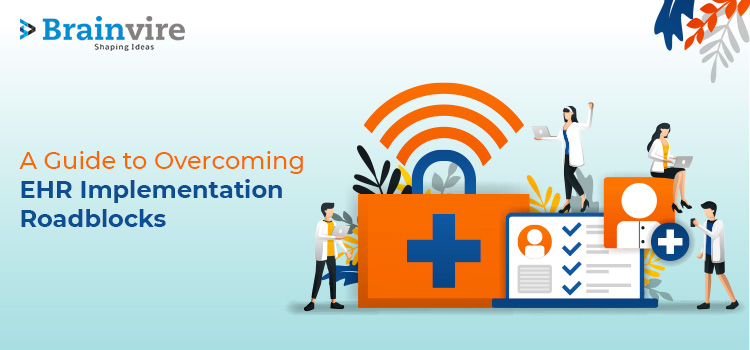
It has been over a decade since digital technology radically transformed industries. The healthcare industry is no exception. Unlike yesteryears, management of patient records has shifted from paper to software on computers. No wonder Electronic Health Records or EHR systems are gaining wide popularity.
The HITECH Act, 2009 suggested that EHRs will become a core part of healthcare. The future predicted then is unfurling after a decade. In the year 2020, EHR adoption rates stand at 90% in the USA. The system is largely being implemented at both regular and critical access hospitals. Data from Statista also suggests that the EHR market is expected to grow to $40 billion by 2024.
While this holds true, there’s still a wide gap between implementation and deriving benefits from it. The system is posing several challenges for the users it is meant to benefit. In this article, we’ll look at these challenges and ways to overcome them.
EHR and Challenges in its Implementation
Have you ever seen a patient’s health chart? An Electronic Health Record is nothing but the same chart in a digital format. It stores the medical history, current health status, progress reports and other details of patients in a single location.
These real-time records not only help streamline operations and workflow in medical facilities but also provide a broader view of patients’ health. This enables healthcare professionals to provide better care by predicting issues and taking timely decisions to tackle them. You can get it customized by telling your asp.net core development company.
Although the system sounds like it is a boon for healthcare practitioners, it is not as simple as that. In most cases, EHRs are not bringing in the convenience that it is meant to for its users; the healthcare practitioners. As per a study conducted by Definitive Healthcare and Vocera in 2019, around 77% of clinicians believe that EHRs are one of the biggest causes of burnout.
It requires medical practitioners to ensure accuracy of data entry. Since these professionals are spending more desk time dealing with patient data, they’re losing out on actual time spent with patients. Instead of helping improve patient care, EHRs are adversely affecting quality of care and patient experience.
This is not the only reason why medical professionals are not very fond of EHRs. There are issues with data as well. While it is known to provide real-time data and valuable insights that can help improve healthcare practices, the quality of data is questionable. With around 18% of records being duplicate, it poses serious risks in providing care to patients, demands more attention from clinicians, and contributes little in advancing healthcare technologies.
In addition to that, data has to be transferred manually from one system to the other.
The recent pandemic shed light on these problems, as well as the need for improved data management systems to handle large numbers of patients with ease. This is where developers like an asp.net development company also comes into the picture. The crisis that the entire world faced in 2020, made healthcare technology professionals look at solutions for improvement in EHR.
Now, as a healthcare provider, you might worry about buying an additional EHR software and increased costs of implementation. But, what if we tell you that EHR systems can be optimized without compromising the interests of medical professionals and technology experts?
Ways to Smooth EHR Implementation
One of the biggest hurdles in implementing any new technology, including EHR for private practice, is resistance to change. Apart from this, there is also the lack of knowledge of the purpose and development of these technologies among clinicians who use it.
To minimize the challenges discussed above, healthcare professionals need to be involved with EHR systems right from the development stage. By adding their perspectives, they can help make them more specific to use. A collaborative approach between medical practitioners and the asp.net core development company in development and implementation of EHR will enhance its effectiveness in the long-run. Here are some actionable steps to help you with smooth EHR execution:
Mapping Out the Workflow
Implementing EHRs is not limited to digitizing patient records, but extends to redesigning operations and workflows.
Like the introduction of any technology disrupts the way a task is performed, EHR systems will render certain processes obsolete. Moving to a new way of executing workflows will also take time. Close evaluation of processes in the early stages of development of EHR helps bring in efficacy to the eventual implementation.
Take a good look at your clinic’s processes and note where EHR systems can be helpful in improving productivity. Typically, tasks involving a number of people usually benefit by automation. Once you have it figured out, you can analyze the current status and design workflows that will improve these processes to include them in EHR.
Refining the System during Development
Imagine completing a problem and finding out that you used the wrong combination of numbers in the beginning! Not only does the task get frustrating but also takes away a lot of your time.
Similarly, having to rework on EHR systems takes a toll on your time, productivity and money. Include steps to prevent errors while the EHR system is still under development. The benefit of having medical professionals involved is that several issues related to usability can be prevented.
Although you cannot have everyone in your clinic onboard to test the system, you can create groups that represent different departments. Choosing people who are experts at their jobs will help detect any potential problems quickly. Conducting a performance test done once the system is running further helps improve its overall functioning. This enables users to enhance patient experience by reducing the load and time associated with EHR systems.
Since upgrading these systems might alter its functionality, timely checks and inspections are a great way to maintain efficiency.
Training Clinicians Beforehand
Resistance to change is a result of people being comfortable with the way things have been done for years. When digitizing the maintenance of health records means people will have to shift to a new system of doing things. This is where training plays an essential role.
For a seamless transition from paper to electronic, healthcare professionals can offer their teams EHR training courses. The first step for a successful training program is to understand the level of clinicians’ computer skills. Start with the basics of the EHR system and move on to more advanced tasks. The tech-savvy medical professionals in the team can also be placed as mentors to speed up the process.
With knowledge of the system and its usability in the early stages of implementation helps your team adapt to change easily and prevents productivity problems.
In Conclusion
Like any other digital system, EHRs are also undergoing continuous innovation to make them effective in handling any healthcare contingencies like the pandemic. Be it large-scale or simply a process-oriented need, implementation of EHR is a complex process. By taking the above-mentioned measures, as well as working along with your asp.net core development company, you can successfully bring efficiency to your healthcare facility.
Related Articles
-
Firebase: A Sturdy Base for Your App, Website, and Business
Businesses are switching to automated and digital solutions. Digital businesses make optimal use of the latest technologies to develop innovative business models, inner abilities, and customer journeys. Why should your
-
Top 15 Questions To Ask Before Hiring an Offshore PHP Development Company
In this web world, where businesses just can’t do without websites and applications, everyone knows the importance of bringing their businesses online. As a result, the number of programming languages
-
7 Tips to Write Informed React Code
ReactJS is a highly intuitive open-source JavaScript Library. It creates impressive web apps in less time, effort, and with minimal coding. ReactJS primarily is used to develop User Interfaces (UI)



